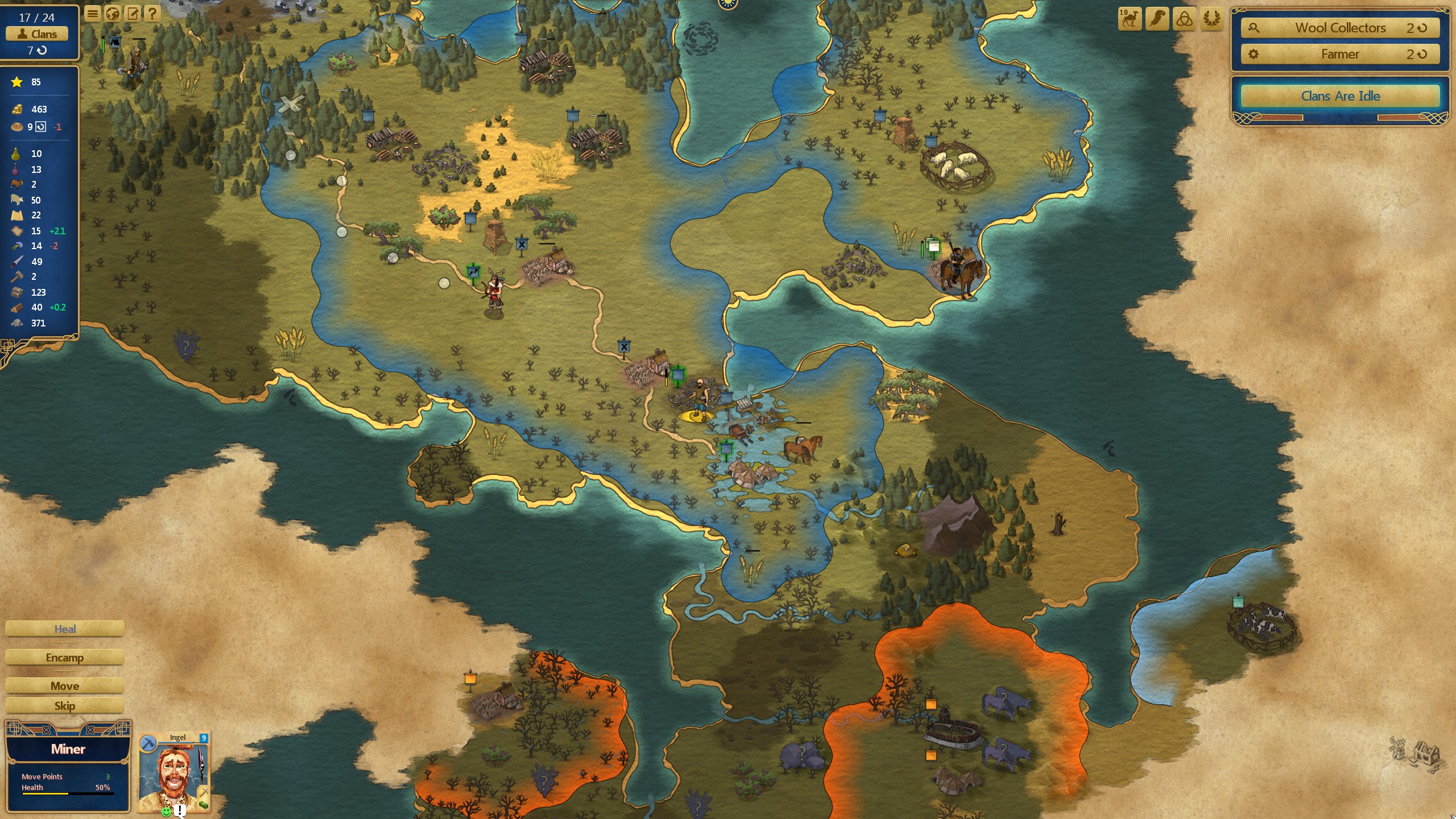Our Verdict
Passive AI and a flawed economy ruin what could have been a refreshing 4X experiment.
PC Gamer's got your back
What is it? A single-city 4X game where you have to take down the Romans.
Expect to pay TBA
Developer Conifer Games
Publisher In-house
Reviewed on GTX 1080Ti, Intel i7-8086K, 16GB RAM
Multiplayer None
Link Official site
Buy it Steam
It was wine that finally took down the Romans. At the Gates is a 4X game where victory is only achieved if you conquer either the Eastern or Western Roman Empire, and facing what at first seemed like insurmountable odds, I turned to alcohol. It funded my war machine, kept the clans happy and the grapes fed everyone during winter food shortages. My burgeoning barbarian kingdom owed everything to its vineyards. That and the extremely sleepy AI.
My boozy realm was initially born out of necessity. At the Gates draws from a lot of different sources, from Civilization—designer Jon Shafer was the lead designer of Civilization 5—to worker placement games such as Agricola, but like a survival game, it’s driven by harsh weather and resource scarcity. When you find a large source of food (or booze) you make the most of it.
Every playable barbarian faction is limited to a single city. Expansion is largely done by plonking down watchtowers or fortifying buildings outside of the settlement, and it’s usually with a specific resource in mind. My thirst for the delicious grape led me to expand north, building more vineyards there, but when they dried up, my workers moved on and the borders retreated. The barbarian kingdoms are agile, adaptable up-and-comers, in contrast to the inflexible Roman powerhouse.
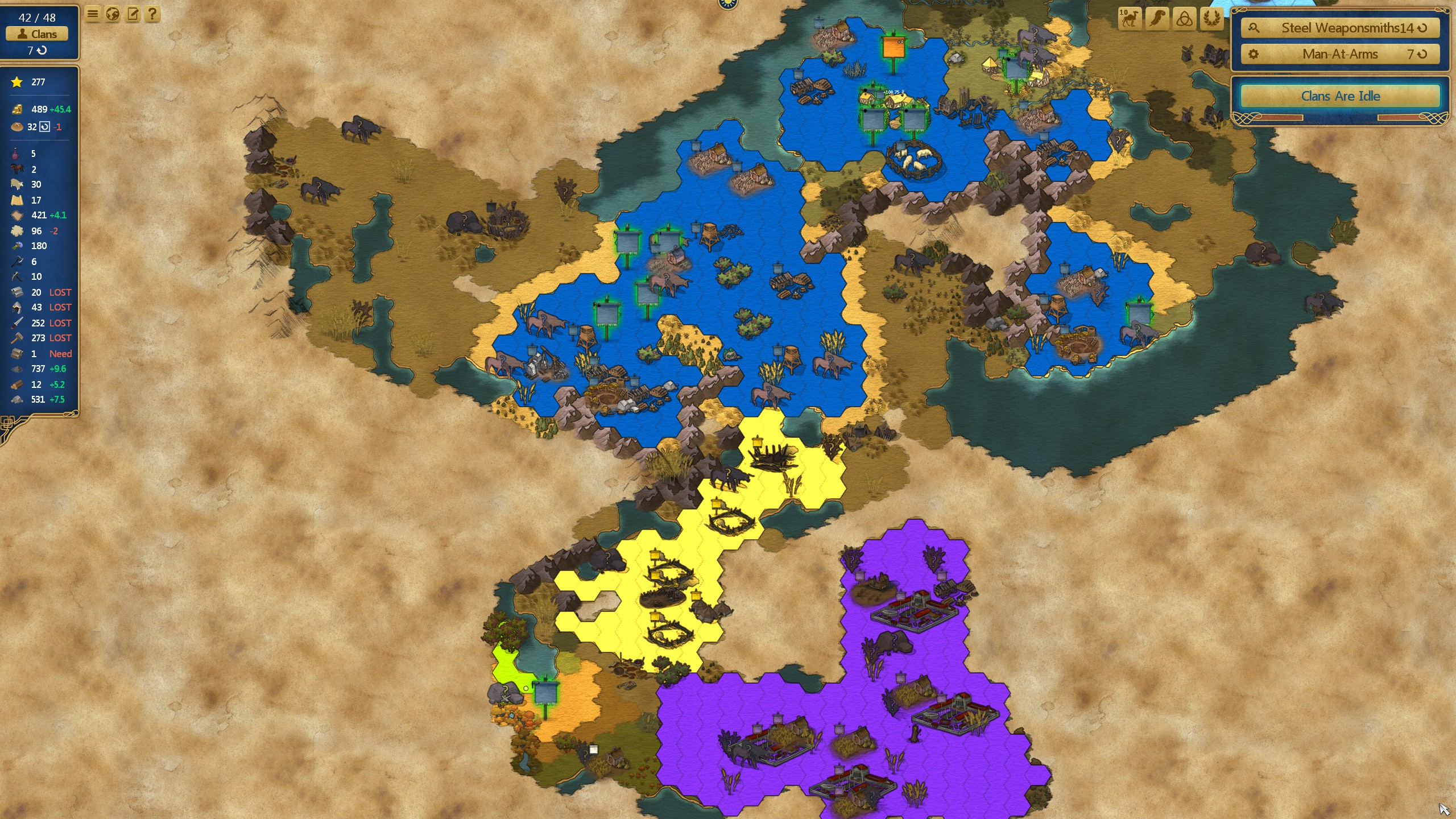
At least they are when there’s a player running the show. Otherwise, the barbarians seem pretty content to do very little at all, aside from pointlessly moving troops around within their own borders. The Saxons to my south, for instance, started out more developed—the starting situation is purposefully unbalanced—but then never expanded or built anything new.
Instead of managing an empire, you’ll spend most of your time managing people. Clans do everything. Each is a single unit that can be assigned jobs that run the gamut from winemaker to priest. Instead of the research tree being full of inventions and concepts, it’s full of professions, which in turn unlock new resources, tools and buildings. They’re at the centre of everything, so putting people in the right job is a big part of running a kingdom. Being a barbarian monarch, it turns out, is a lot like working in recruitment.
It’s a bit more complex than just finding a hairy barbarian, giving them a briefcase and sending them on their way. People are often abstract concepts in 4X games, distilled down to a simple resource or disposable units, but At the Gates’ clans have some welcome humanity, reflected by their traits, both positive and negative, and desires. Some of my clans decided that they would much rather work inside the settlement, and they grew upset the longer they went ignored. In fairness, the clans were working in the snow.
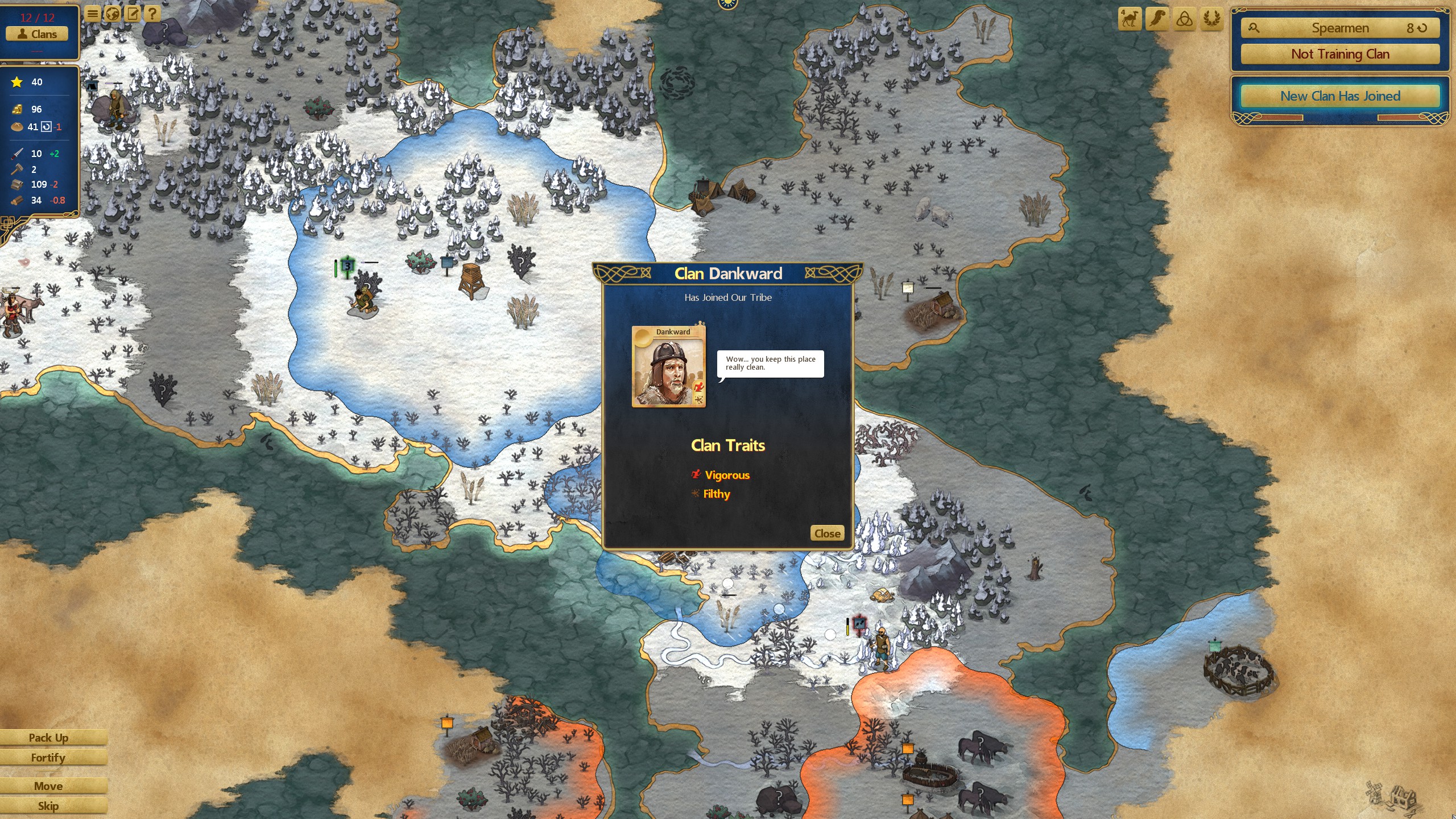
Winter’s generally a bad time. Crops die, buildings close down, and people stop moving and start moaning. If you’ve prepared, you’ll get through it, and if you haven’t, you’ll struggle, but there’s not really much you can do during winter. You’ve just got to wait it out, which isn’t the most thrilling activity, and unfortunately it lasts for several turns.
Amid the familiar crises like your farms not producing enough food, there are problems with less clear solutions, like your two best spearmen units suddenly becoming mortal enemies. There’s a lot of juggling to do as you try to keep everyone happy and in the role that’s appropriate for them. Training them in a new job is as straightforward as sending them back to the settlement and waiting for a few turns, so there’s a lot of room for experimenting with different worker loadouts, while miserable clans can be cheered up with booze. My starting location paid off again.
Despite being a more human 4X, you’re still trying to create an efficient machine. I’m not ashamed to admit that I’ve gleefully celebrated squeezing another 1.5 food out of my farms. The final objective might be the conquest of Rome, but the path to get there is much more evocative of a tycoon game, full of worker micromanagement and manufacturing chains. Every resource has an industry just waiting to spring up around it, and though it’s the beginning of the Dark Ages, it looks like getting rich is still the fastest route to success.
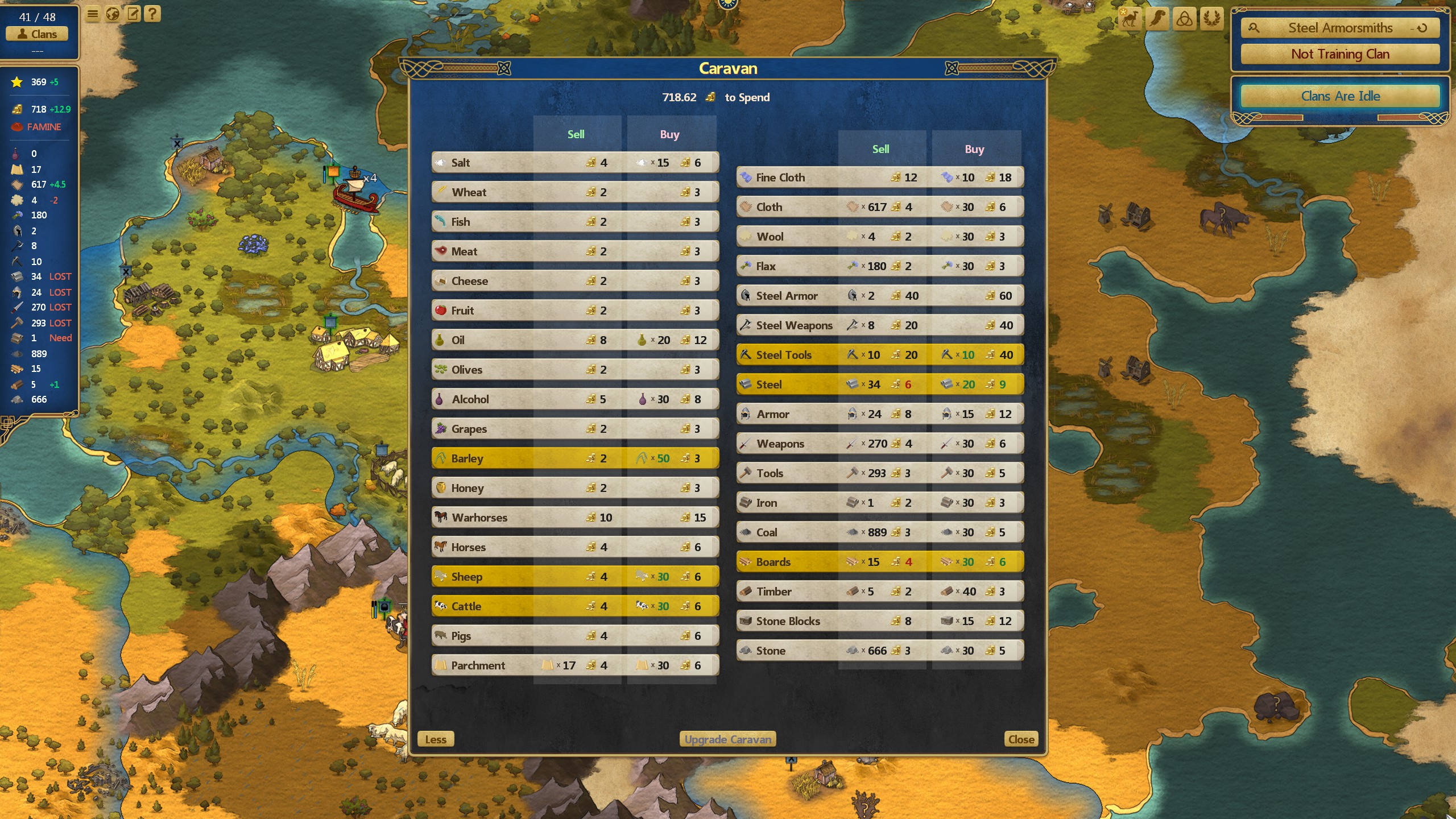
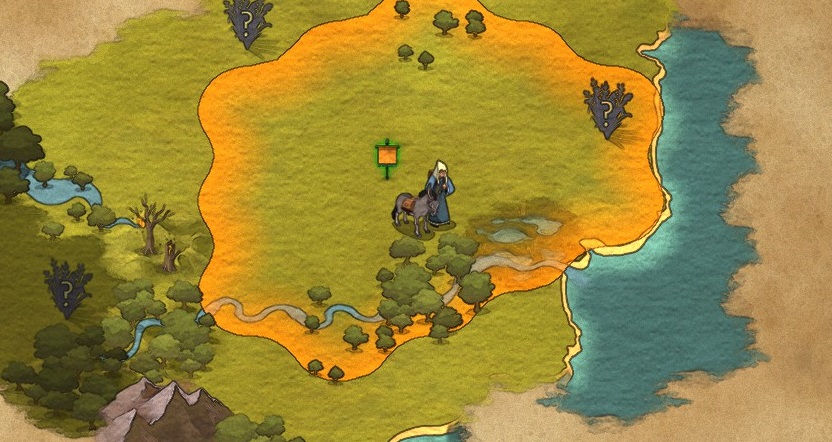
Barbarians start off as nomadic, so before you decide to put down some roots, you can pack up your settlement and head off to somewhere better. Since you only ever get one settlement, it's worth taking a bit of time to find the perfect spot, close enough to lots of different resources that can eventually be swallowed up by the your borders, which can then be expanded by watchtowers and other buildings.
The maps are randomly generated, but they're defined by rules that create climates and geography that approximate the real world, which also gives you some idea of what to expect as you look for a permanent home.
Get a bit of cash in your pocket and all your worries about resource shortages will wash away, along with a lot of reasons to keep playing. Gathering up massive piles of gold is a lot easier than producing enough food to feed all of your clans, too. With only the occasional gold mine and one trade building, I was set for life.
With my fat bank account, I was able to go on shopping sprees every time the caravan pulled up to the settlement. There’s no trade between the factions—interactions are limited to declaring war and making alliances that, as far as I can tell, don’t do anything—so this caravan is the only way to buy things. Its stock is random, but as it visits several times a year, I was usually able to get everything on my shopping list. The caravan also buys goods, and you better believe I shifted a lot of wine. It’s exploitable, too, so buying and reselling the same item over and over again nets you a profit, though I was never so hard up that I was tempted to use it.
Without adversity, At the Gates is a pretty straight line to Rome. Or Constantinople, if it’s closer. There are two ways to win: conquer one of the Roman capitals or take them over peacefully. The latter is framed as an economic victory because it costs quite a lot of money, but it also involves a lot waiting around, doing nothing for turn after turn. The money is better spent on equipping soldiers and sending them to kill Romans, which is exactly what I did. It was uneventful.
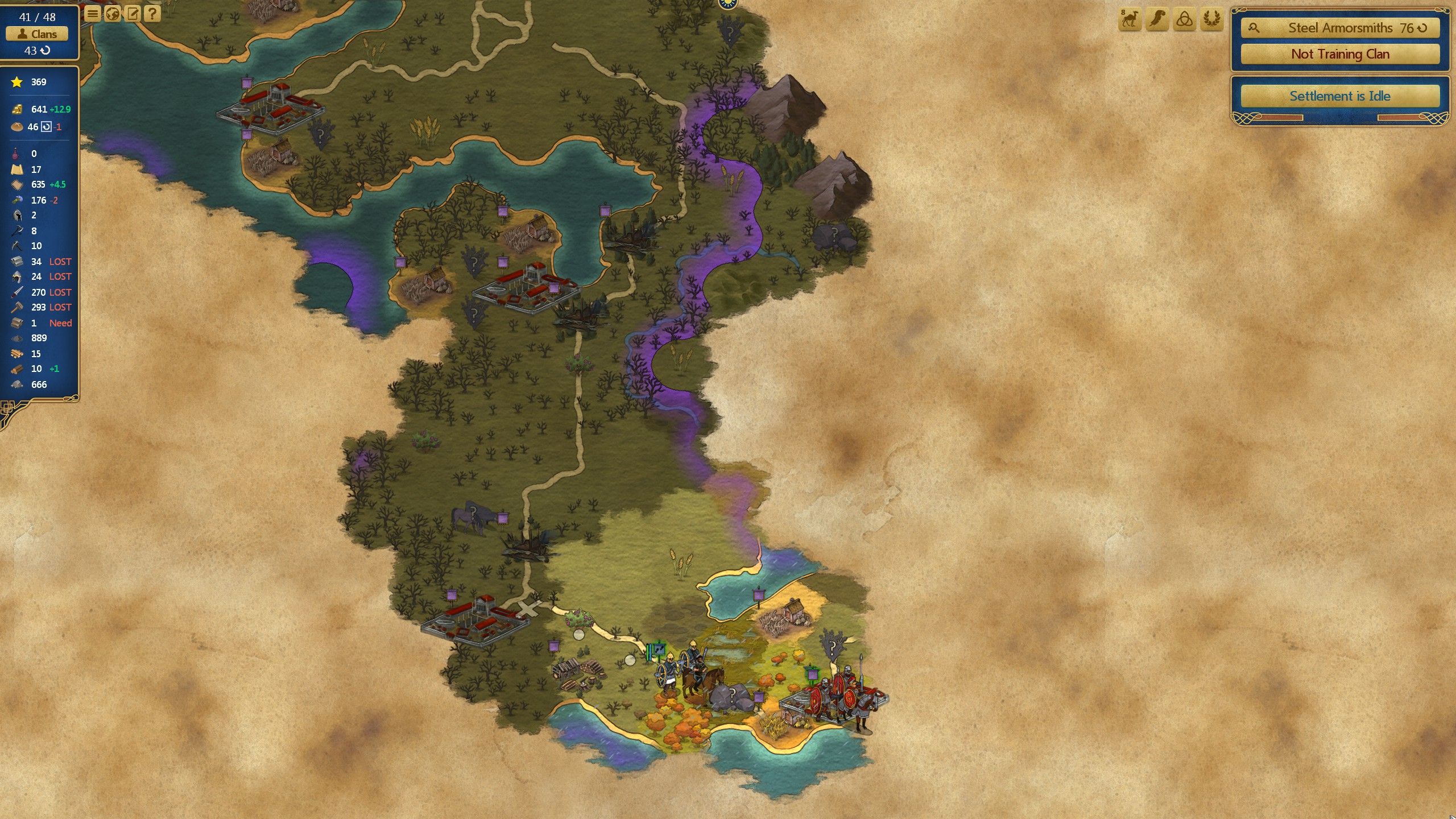
My sauced up warriors—the wine helped with morale—marched across the world and, finally within the borders of the Eastern Roman Empire, proceeded to conquer every city one at a time. Every single legion stayed behind the walls of its respective city. The other factions acted with equal indifference to my sieges. All it would have taken to crush my invasion was one tiny bit of teamwork, but they just sat there, passively waiting for the end, which came swiftly and unceremoniously.
That was the thing that I'd been working towards all this time, but there was no satisfaction and no resistance. When the AI can't even try to defend itself, it doesn't seem ready for launch. And that's just the most game-breaking of the issues, which also include pretty frequent crashes when trying to load a game and units occasionally not being able to attack buildings during a war.
The ability to buy your way out of most problems and passive AI make it feel like you’re taking advantage of an exploit even when you’re playing it normally. At the Gates’ challenge is meant to be a hook, with it even sharing the roguelike philosophy of teaching through failure, but none of that was apparent as I walked my hordes to victory. It undermines the survival elements and the whole underdog premise, leaving At the Gates with a bunch of novel 4X ideas that quickly fizzle out.
Passive AI and a flawed economy ruin what could have been a refreshing 4X experiment.

Fraser is the UK online editor and has actually met The Internet in person. With over a decade of experience, he's been around the block a few times, serving as a freelancer, news editor and prolific reviewer. Strategy games have been a 30-year-long obsession, from tiny RTSs to sprawling political sims, and he never turns down the chance to rave about Total War or Crusader Kings. He's also been known to set up shop in the latest MMO and likes to wind down with an endlessly deep, systemic RPG. These days, when he's not editing, he can usually be found writing features that are 1,000 words too long or talking about his dog.
